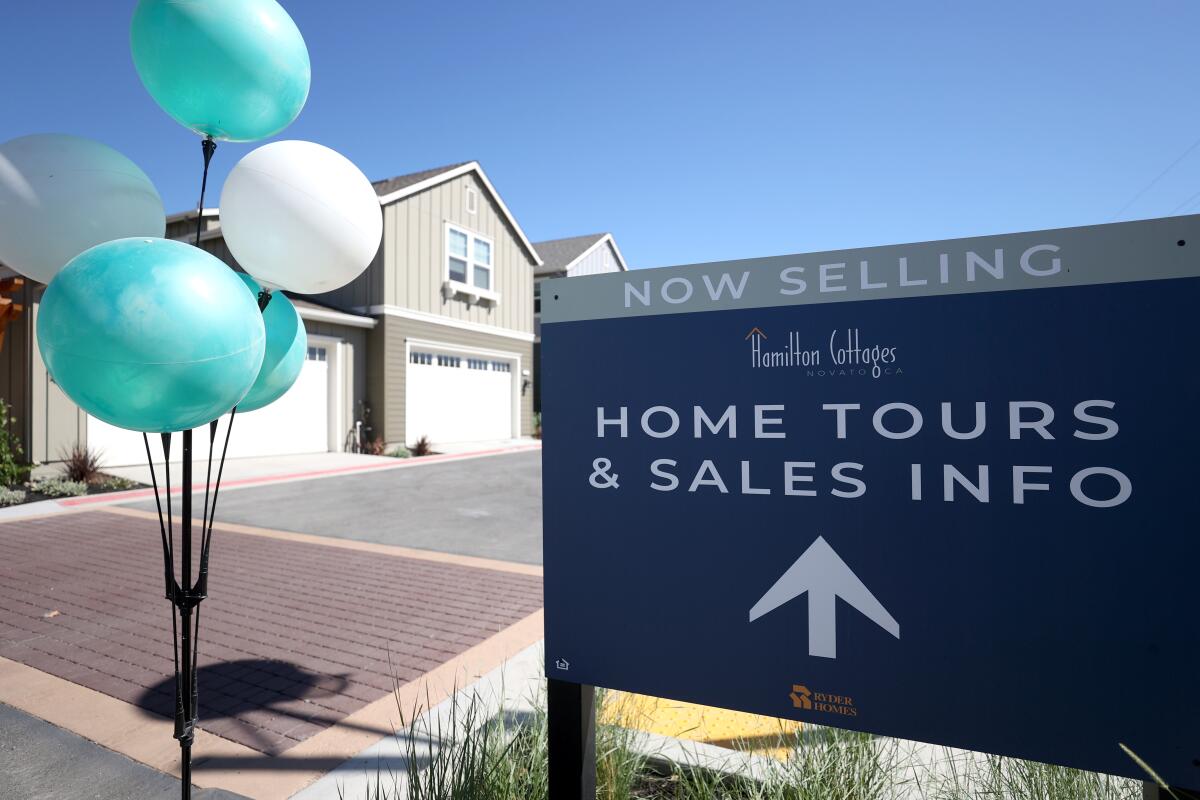Mortgage rates are rising. Experts cite economic strength, inflation and possible Trump win

- Share via
In September, the Federal Reserve lowered its benchmark interest rate for the first time since 2020, giving hope to prospective home buyers that mortgage rates would follow suit.
But instead of declining, home loan costs marched higher.
On Thursday, mortgage giant Freddie Mac reported the average rate on a 30-year home loan rose to 6.72%, up from 6.54% a week earlier. It was the fifth consecutive week of increases.
“People are confused,” said Jeff Lazerson, president of Mortgage Grader in Laguna Niguel. “They are saying ‘What’s going on?’”
The fact that mortgage rates have gone up despite the cut underscores that while the Federal Reserve influences mortgage rates, it does not set them.
Instead, rates are determined by what institutional investors who purchase bundles of mortgages are willing to pay for them and a variety of factors influence those investors.
One is the benchmark rate the Fed cut in September, which sets a floor on borrowing costs throughout the economy. Another is expectations for inflation. That’s because when purchasing 30-year mortgages, investors don’t want to see the value of their investment eaten away as the years march on.
Mortgage rates fell in advance of the Fed’s decision in September, because investors priced in the expectation the Fed would be able to cut because inflation had eased.
Experts said one major reason rates have risen since is because economic data has come in stronger than expected. That’s convinced investors inflation will stay higher for longer and the Fed won’t be able to cut rates as much as they otherwise could have. Similarly, if the job market is stronger, there’s less of a need to cut rates to spur growth.
“You see a lot of positive economic surprises,” said Kara Ng, an economist with Zillow, who cited a strong jobs report in September as one example.
On Friday, the Labor Department released October figures that showed job growth slowed dramatically last month. However, those numbers were made worse by hurricanes and a large strike at Boeing that temporarily knocked workers off payrolls. The unemployment rate stayed the same.
Explore the latest prices for homes and rentals in and around Los Angeles.
Political factors could be pushing mortgage rates higher as well as presidential election polls have tightened in recent weeks.
Chen Zhao, an economist with real estate brokerage Redfin, said it appears investors increasingly believe former President Trump will best Vice President Kamala Harris and retake the White House.
According to a recent survey from the Wall Street Journal, most economists predict inflation and interest rates would be higher under policies proposed by Trump, who among other measures has called for sweeping tariffs on imported goods.
“The link between tariffs and inflation is just very stark,” Zhao said. “There is not a lot of controversy there.”
As rates rise, home buyers feel the pinch.
Lazerson, the Orange County mortgage broker, said he’s seen business slow to a “trickle” after an initial burst when rates dropped around the Fed announcement.
The reason is simple math.
When rates hit their recent bottom of 6.08% in September, the monthly principal and interest payment on a $800,000 house would have been $3,870. It’s now $4,138.
According to the weekly Freddie Mac survey, rates are still below 7%, a level last seen in May. However, a daily tracker from Mortgage News Daily puts them above that threshold.
Zhao said what happens with rates next depends on a variety of factors, including who wins the election and what policies they actually enact.
If there isn’t a policy shift, she would expect mortgage rates to come down next year because inflation is easing. On Thursday, an inflation measure closely watched by the Federal Reserve dropped to near pre-pandemic levels.
Even so, economists say borrowers shouldn’t expect pandemic-era mortgage rates of 3% and below. Those rates were the byproduct of a massive federal effort to revive an economy where unemployment hit levels last seen in the Great Depression.
“We are talking about [mortgage rates in] the high fives, low sixes” Zhao said. “If President Trump does win, there is certainly a lot more risk that rates could be higher.”
More to Read
Sign up for Essential California
The most important California stories and recommendations in your inbox every morning.
You may occasionally receive promotional content from the Los Angeles Times.












